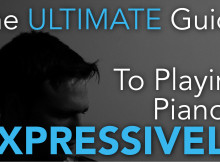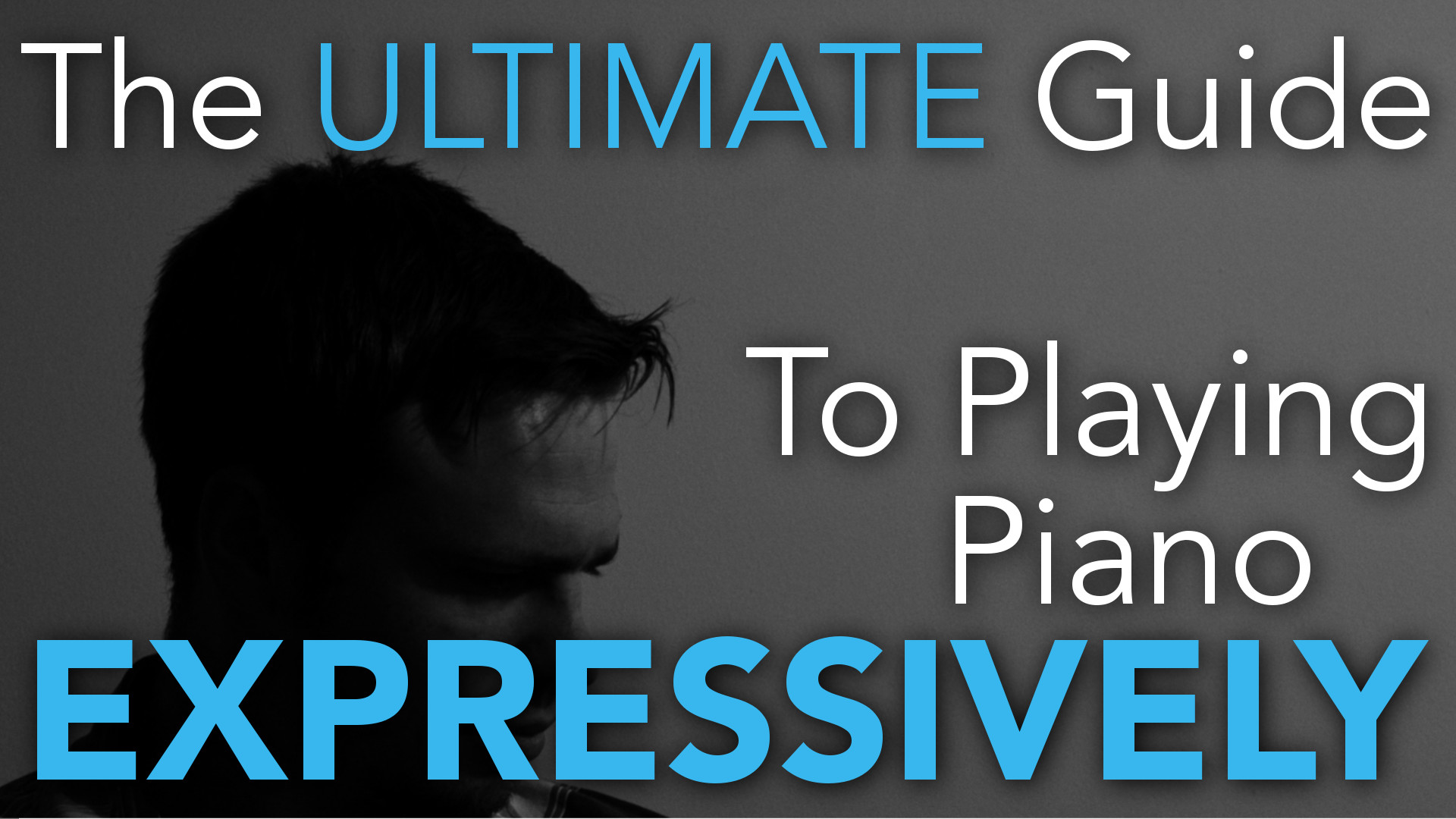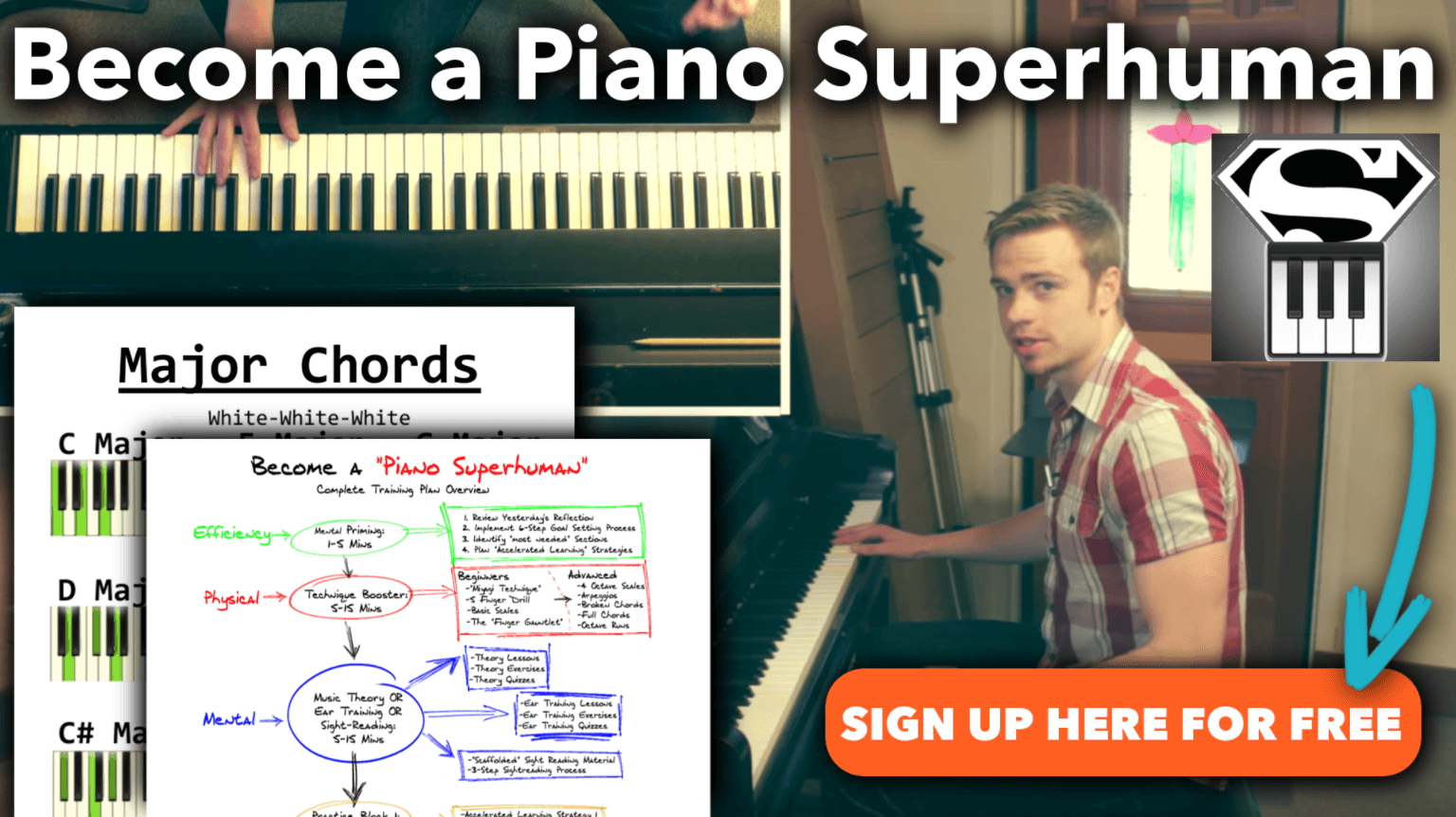You know what’s truly amazing to me about music? You can feel an emotion, transfer that emotion to movement in your fingers, which transfers it to sound in the air. The sound moves through the air, hits someone’s eardrum, and is transferred to an emotion they feel. You can literally transfer an emotion you have to another person. That’s amazing to me. That’s why they say music is the language of emotion. By playing piano expressively you can literally change someone’s emotional state.
But can you learn how to do this? Hell yea. I used to thing it was just “something inside us” or something “some people just had a knack for”. Its not. It’s a completely learnable skill just like you can learn to sightread or learn to play scales. And you learn it just like anything else, by practicing.
So how do you learn to play piano expressively? Here are the five main techniques I use to practice playing with emotion:
1. Experiment to Play Piano Expressively
Once you learn the notes of a song, there are really only three elements you can change: dynamics, articulation, and tempo. Try messing with these three aspects, and experiment with different ways of playing with them. Seriously, you can learn a lot by just messing around.
For dynamics, don’t simply read the music and play the F parts loud and the P parts soft. That’s only the first level of dynamics, the beginner’s stage. You can add swells, or small crecendos/decrecendos in places where it isn’t written. Try to feel the harmonies and use that to guide you. You can also try accenting different notes to bring them out more.
Articulation is how staccato or legato you play. Don’t simply read the staccato dot and just play the note shorter without thinking about it. Try to put yourself in the shoes of the composer, think about the emotion he or she is trying to convey. Use that and try to play the staccato in a way that will convey the feel of the song the best.
Same goes with tempo. Try gradually speeding up and slowing down with the music. A good trick is to start a phrase slow, speed up slightly into the climax of the phrase, and slow the tempo back down at the end of the phrase.
2. Imitate Others
Go to YouTube and watch a bunch of different versions of the piece you’re playing. It’s crazy how two versions of the exact same song can sound completely different. Some things you’ll like, some things you won’t. Take the things that sound good to you and use them when you play.
A lot of people are against doing this because they think it’s “copying” other people and it’s not being true to yourself. Here’s the thing though, no matter how hard you try to copy someone, it’s still going to have a piece of you in it. It’ll sound slightly different than their version, like it’s their version with a twist. So it’s still your version of the music. And realize too that people imitate others musically all the time; sometimes it’s subconscious, they might not even realize it. People are affected by others emotionally and is not a bad thing, it’s beautiful.
So when you hear someone playing piano expressively, try to imitate them.
3. Move with the Music
Studies show that physical movement affects emotion just as emotion affects physical movement. When you’re happy you smile. But if you smile, it also makes you feel happier. So try moving your body with the music. Sometimes it will feel forced, but eventually you’ll get the hang of it and know how to manipulate your emotions and sound with movement.
You should feel confident with how you look when you play. Take a look at some YouTube pianists. Some of them have weird facial expressions. But it helps them play the piano more expressively. I have this weird head-shake thing I do a lot when I play… but it helps me get into the zone and play better. Don’t be self conscious about how you look when you play. Other people don’t care how you look when you play, they care how you sound. And if they judge you on how you look, they’re not the type of people whose opinions you should care about anyway.
4. Visualize
The subtleties of playing with emotion are hard to explain with words. There are tons of minute changes you make every second. It’s just like when you convey emotion with your face. When you convey happiness, the outsides of your eyes squint slightly, the corners of your mouth raise, and your lips pull back to reveal a smile. You don’t think about these small changes, they happen subconsciously.
The same goes for playing piano. To make a single chord sound more sentimental, you slightly slow down the tempo, relax your wrist, and round your arms down and out when you play it. You don’t have time to think about these movements, they have to come from your subconscious. To come from your subconscious, they must be triggered by an emotion.
One way to get into an emotional state is visualization. Before you play, take 15 seconds and visualize a scene that could relate to your music. For example, if you’re playing a calm, serene, beautiful piece, imagine you’re sitting by a quiet, still lake. If you’re playing a fast, loud piece, imagine you’re in the middle of a war zone before you play. You can even think of an emotional event that’s happened to you in the past. Make the visualization so vivid that you can feel it.
After a minute or so, start playing and notice the difference. Whatever feeling you have will transfer to how you play. Without you even realizing how you’re playing differently, it will come out differently because of your emotional state and help you play piano expressively.
5. Emotional Extremes
Here’s another cool little trick that can help you play piano expressively. Play your song first with no emotion at all. Just play like a robot. Then contrast that by playing with as much emotion as you can. Just dripping with emotion. Overdo the expressiveness. The contrast between playing non expressively and super expressively will give you a bigger frame of reference to how much emotion you can play with.
Never underestimate the power of music. It can truly be used to move people. Always keep in mind the whole reason you’re learning the notes and technique is to get to the point where you can really put yourself into the music. Try these techniques and let me know if you have some other ones that work for you!
-Zach




Hi Zach,
Truly love what & how you teach! You explain clearly and slowly enough for me to understand and clearly demonstrate what you are teaching. I am able to follow your hands on the piano while you are explaining .
Thank you.
HI Zach try yo play like you said, right now the last 4-5 days l play around two hrs day kip playing that page rhythm do not try to go a head to get it down more ,play Hanon 5 finger did play 1 to 20 my hand stiff the time go fast try play whit motivation tank Jacques
Zach, I’ve been looking for the “Secret Sauce” Video and think I’ve gone through all the vids you sent, but I can’t find the one on Secret Sauce, which I’ve been practicing daily. I just wanted to look at it again.. I’ve learned a lot thanks to you. Dave Terry
Zach, I couldn’t agree with you more that human emotion is fundamental to what music is all about. What good would playing a song on the piano be if it did not emotionally move either the pianist or his/her audience?
Do you know that there are research studies that confirm your conclusion that playing music in particular ways creates different emotional responses even though each way of playing follows the musical score? The studies I am referring to used functional MRI scans to follow the activity in various areas of the human brain associated with different emotional states as the subjects listened to various versions of a musical score. What the researchers found was that just playing something in robotic, but quite accurate, fashion resulted in very little emotional response. When a pianist added their own subtle (and often subconscious) touches the subjects often had very strong positive responses. The subjects also verbally reported these differences in line with the MRI readings.
So changing the articulation of a piece is an essential part of masterful playing. I would add another element to the three you mentioned that is always modiified by our emotional interaction with what the composer has written: the rhythm. Computer analysis of musical performances confirm that no one ever plays exactly as the rhythm is notated. It may be important to try to match the notation while we are learning, but once basic skills have been acquired, subtle changes in rhythm are natural and vital to expressive playing. As you practice, try varying the timing of the notes ever so slightly to see what I mean.
Keep up the good work, Zach. What you are doing is very creative and helpful to those of us trying to develop better technique and put more of our feeling into our playing.
Chuck
Thanks Zach. This is awesome. I think I already play with some emotion but this will probably help me more thanks so much.
Hi Zach,
Amazing and such helpful insights. I do all of these instinctively without thinking about them, but until now I felt somewhat condemned because at Boise State University Music Department the pianist is required to hold perfect, pristine posture and restrain all indications of the physical response to emotion.
Now, I can be free to be me and I like to keep this screen up to reference throughout each practice session, repeatedly reading it and becoming very “mindful”, really for the first time in my life, in thinking through the techniques toward playing piano expressively, although subjectively it is what came natural to me from the start, but I have spent a lifetime of forcing my body into “proper alignment” with a feeling of always having to restrain my natural emotional responses while playing, and have even passed this burden on to my students to do the same, thinking it was absolutely required in pianisim(: This forceful restraining wasted a lot of my energy.
Now Zac, you have given me permission to freely express what I hear, and sense from the music that I am playing-I am free to be me! Thank you very much!
Thanks Zach! I love your teaching skill and my nine-year old, he loves Zach’s teaching skill. This is another excelent tips!
Thank you!
Thanks Zach! I love your teaching skill and my nine-year old, he loves this lessons. This is another excellent tips!
Thank you!